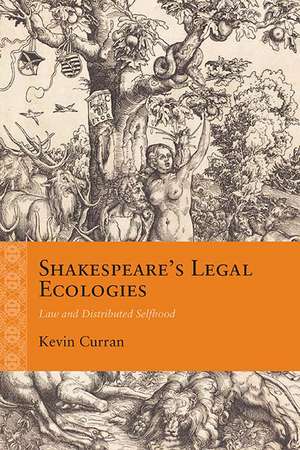Shakespeare’s Legal Ecologies: Law and Distributed Selfhood: Rethinking the Early Modern
Autor Kevin Curranen Limba Engleză Hardback – 14 mai 2017
Shakespeare’s Legal Ecologies offers the first sustained examination of the relationship between law and selfhood in Shakespeare’s work. Taking five plays and the sonnets as case studies, Kevin Curran argues that law provided Shakespeare with the conceptual resources to imagine selfhood in social and distributed terms, as a product of interpersonal exchange or as a gathering of various material forces. In the course of these discussions, Curran reveals Shakespeare’s distinctly communitarian vision of personal and political experience, the way he regarded living, thinking, and acting in the world as materially and socially embedded practices.
At the center of the book is Shakespeare’s fascination with questions that are fundamental to both law and philosophy: What are the sources of agency? What counts as a person? For whom am I responsible, and how far does that responsibility extend? What is truly mine? Curran guides readers through Shakespeare’s responses to these questions, paying careful attention to both historical and intellectual contexts.
The result is a book that advances a new theory of Shakespeare’s imaginative relationship to law and an original account of law’s role in the ethical work of his plays and sonnets. Readers interested in Shakespeare, theater and philosophy, law, and the history of ideas will find Shakespeare’s Legal Ecologies to be an essential resource.
At the center of the book is Shakespeare’s fascination with questions that are fundamental to both law and philosophy: What are the sources of agency? What counts as a person? For whom am I responsible, and how far does that responsibility extend? What is truly mine? Curran guides readers through Shakespeare’s responses to these questions, paying careful attention to both historical and intellectual contexts.
The result is a book that advances a new theory of Shakespeare’s imaginative relationship to law and an original account of law’s role in the ethical work of his plays and sonnets. Readers interested in Shakespeare, theater and philosophy, law, and the history of ideas will find Shakespeare’s Legal Ecologies to be an essential resource.
Preț: 765.54 lei
Preț vechi: 933.60 lei
-18% Nou
Puncte Express: 1148
Preț estimativ în valută:
146.50€ • 159.08$ • 123.06£
146.50€ • 159.08$ • 123.06£
Carte disponibilă
Livrare economică 02-16 aprilie
Livrare express 18-22 martie pentru 26.89 lei
Preluare comenzi: 021 569.72.76
Specificații
ISBN-13: 9780810135178
ISBN-10: 0810135175
Pagini: 192
Dimensiuni: 152 x 229 x 18 mm
Greutate: 0.4 kg
Ediția:1
Editura: Northwestern University Press
Colecția Northwestern University Press
Seria Rethinking the Early Modern
ISBN-10: 0810135175
Pagini: 192
Dimensiuni: 152 x 229 x 18 mm
Greutate: 0.4 kg
Ediția:1
Editura: Northwestern University Press
Colecția Northwestern University Press
Seria Rethinking the Early Modern
Notă biografică
KEVIN CURRAN is a professor of early modern literature at the University of Lausanne in Switzerland. He is the author of Marriage, Performance, and Politics at the Jacobean Court and editor of Shakespeare and Judgment.
Cuprins
Acknowledgments
Introduction
Chapter 1. Property: Land Law and Selfhood in Richard II
Chapter 2. Hospitality: Managing Otherness in the Sonnets and The Merchant of Venice
Chapter 3. Criminality: The Phenomenology of Treason in Macbeth
Chapter 4. Judgment: The Sociality of Law in Hamlet and The Winter’s Tale
Coda: Shakespeare’s Ethics of Exteriority
Notes
Bibliography
Introduction
Chapter 1. Property: Land Law and Selfhood in Richard II
Chapter 2. Hospitality: Managing Otherness in the Sonnets and The Merchant of Venice
Chapter 3. Criminality: The Phenomenology of Treason in Macbeth
Chapter 4. Judgment: The Sociality of Law in Hamlet and The Winter’s Tale
Coda: Shakespeare’s Ethics of Exteriority
Notes
Bibliography
Descriere
Shakespeare's Legal Ecologies examines the key role that the law and legal frameworks played in the ways Shakespeare explored character and selfhood.














